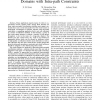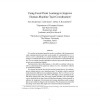23 search results - page 3 / 5 » Utile Coordination: Learning Interdependencies Among Coopera... |
AAMAS
2007
Springer
13 years 7 months ago
2007
Springer
Abstract. Networked multi-agent systems are comprised of many autonomous yet interdependent agents situated in a virtual social network. Two examples of such systems are supply cha...
AROBOTS
2011
13 years 2 months ago
2011
Abstract— Many applications require teams of robots to cooperatively execute complex tasks. Among these domains are those where successful coordination solutions must respect con...
AAMAS
2005
Springer
13 years 7 months ago
2005
Springer
Cooperative multi-agent systems are ones in which several agents attempt, through their interaction, to jointly solve tasks or to maximize utility. Due to the interactions among t...
ATAL
2007
Springer
14 years 1 months ago
2007
Springer
In this paper we consider the problem of managing and exploiting schedules in an uncertain and distributed environment. We assume a team of collaborative agents, each responsible ...
AAMAS
2011
Springer
13 years 2 months ago
2011
Springer
We consider an automated agent that needs to coordinate with a human partner when communication between them is not possible or is undesirable (tacit coordination games). Specifi...


